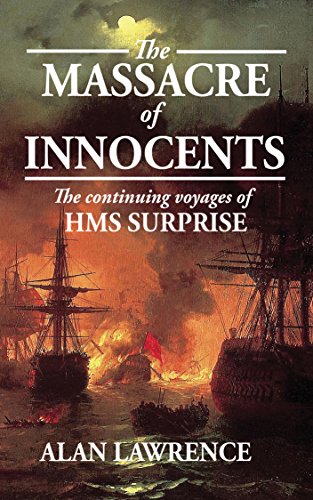|
Alan Lawrence, The Massacre of Innocents (Mainsail Voyages, 2014) I really liked The Massacre of Innocents, the first volume of Alan Lawrence's continuing voyages of HMS Surprise. But I wanted to love it. The novel, Lawrence's first, quite clearly wanted to be a sequel to Patrick O'Brian's beloved series of novels featuring Capt. Jack Aubrey and his bosom companion, Dr. Maturin. But, as Lawrence explains in his foreword, O'Brian's estate forbids sequels, so he revised his work to a slightly later generation -- the next HMS Surprise in the British Royal Navy.
The novel is set in 1823 and '24. Britain's wars with France are over, and many of its naval officers and sailors are stuck ashore. O'Connor leaps at the chance to command the frigate Surprise, even though it means appearing to give up his commission in the British navy for some time. He and his crew offer their services to the cause of Greek independence from the Turks -- a cause that England supports but does not want to promote directly. It's an interesting period of time, one rarely the focus of a nautical adventure. Lawrence clearly did a great deal of research on the time, and his knowledge of the political climate there and the military movements of both the Greek and Ottoman fleets is beyond reproach. There are some weaknesses here, though, which prevented me from enjoying this book as much as I'd hoped. It's slow to get started. Lamentably slow. Readers won't see any real action until they've gotten through more than 250 pages; up 'til then, the most discord has to do with a broken violin string and the doctor's choice of clothes for dinner. Much of the time when Surprise encounters an enemy fleet, the ship flees -- which, while probably the wiser strategy given the circumstances, is not very heroic, nor does it make for riveting reading. O'Connor is, it seems, without peer in the Royal Navy, the subject of unceasing respect and admiration from his crew, his fellow captains, his superiors and even representatives of other nations. And yet, for all his boldness, he spends a great deal of time in this book whispering, overcome with emotion. I believe he even weeps on occasion. When the Surprise first sees action, the ship suffers only one fatality and yet devastates two enemy ships, but O'Connor is overwhelmed with depression because of that death, a very public display of emotion that would be terrible for morale on any military vessel. It is, however, almost a ridiculously happy crew, faces shining and beaming so much it's a wonder they ever need lanterns. Everyone on Surprise is powerfully fond of everyone else, the very best of friends, and they're all just thrilled to bits to be serving together again. And, just to provide some false tension, Lawrence tells us of a man in O'Connor's old crew, his coxswain, who died in previous action ... only to be replaced in this book by his identical cousin, who not only looks like the former seaman but also behaves exactly like him. Likewise, we're told the captain doesn't much like the doctor's assistant, Michael Marston, but upon arriving for duty they immediately bond over music and become best buds. Duncan Macleod, O'Connor's first lieutenant (and possibly a tip of the hat to TV's Highlander series), is a Scotsman to whom Lawrence has given an overly abundant brogue, which becomes distracting as you read. Consider this sample of dialogue: "Pat, ye will fergive me for expoundin' last nicht upon political matters o' which ah ken noot, or at the most just a wee tait, but it crossed ma mind that perhaps Melville may have somethin' worthwhile to add to oor considerations." I feel like I need a glossary to get through the dialect. The book is also somewhat repetitive, telling readers over and over that, for instance, Murphy eavesdrops at his captain's door and has a mate named Old Jim Lamb, that the volunteer crew expects prizes, that the doctor is unkempt. Or take this example: It was the sound of the fife playing Nancy Dawson, the hands' noon grog about to be issued, and then Dalby's ringing of eight bells which awoke Pat, for he had slept well, and Duncan having forbidden the ringing of the bell during the Morning watch nothing had disturbed him. ... Rookie mistake, Lawrence. Don't tell us something in prose, only to repeat it immediately in dialogue. Also, at some point, readers have come to understand that O'Connor has an exceptional wine cellar onboard his ship. We accept that he and all his compatriots are among the very finest musicians of their age. And yet, Lawrence continues to pound us with these facts far into the narrative. The Massacre of Innocents is a pretty good book, despite its weaknesses. I think it suffers more in this review because I love the O'Brian books so much; my expectations here were too high, I suspect. I hope Lawrence improves in the sequel, giving us more action and more believable characters to follow. 
|
 Rambles.NET book review by Tom Knapp 8 November 2014 Agree? Disagree? Send us your opinions!  



 |

